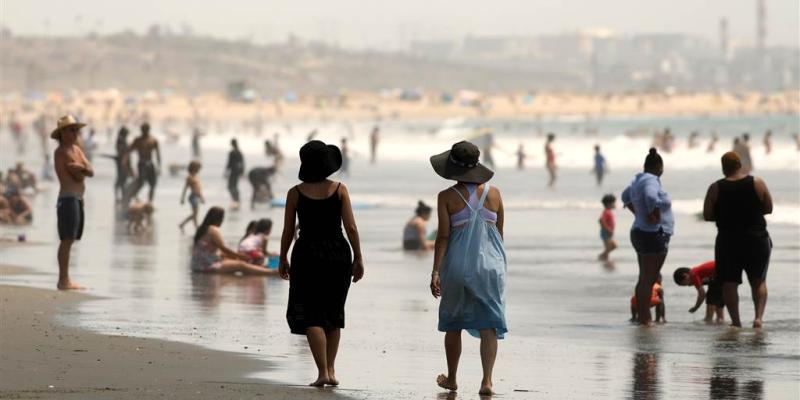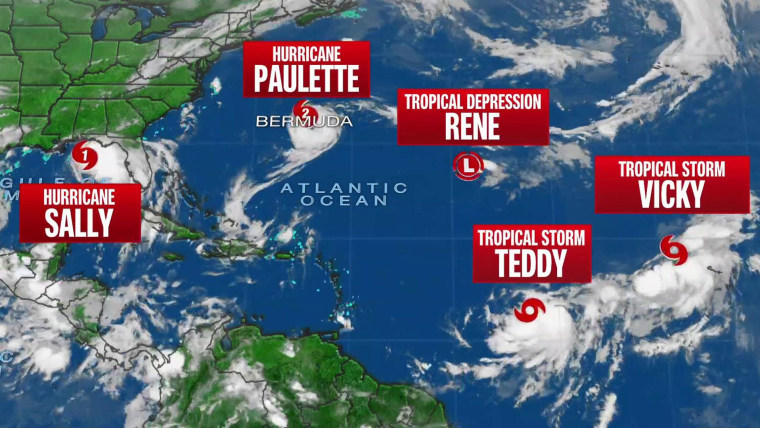Northern Hemisphere summer was hottest on record, scientists say



The worrying milestones come as historic wildfires and extreme weather events in the U.S. have sharpened focus on global warming and the catastrophic impacts of climate change.
August was particularly steamy for the planet. Average global land and ocean surface temperatures last month surpassed the 20th-century average of 60.1 degrees by 1.69 degrees. This makes it the second-warmest August on record, trailing only August 2016, according to scientists at NOAA's National Centers for Environmental Information.
Some regions, however, felt the August heat more acutely. Last month ranked as the hottest August on record in North America, while it was the third hottest in Europe and the fourth hottest for South America and Oceania.
One-third of the U.S. faced at least a moderate level of drought conditions in August, and California suffered through a record-setting heat wave last month, after temperatures in Death Valley hit a sizzling 130 degrees.

Sally upgraded to hurricane in 'most active' storm season since 2005
Southeastern China, parts of northern Russia and western Australia also experienced above-average temperatures last month, NOAA scientists wrote in their latest assessment.
The new figures suggest that the planet is continuing to warm at an accelerated pace. Globally, the five warmest Augusts have all occurred since 2015, and the 10 warmest Augusts on record have occurred since 1998, according to NOAA.
The above-average temperatures also shrank Arctic sea ice to its third-lowest level for August, agency scientists said. Satellite observations revealed that Arctic sea ice last month covered an average of 1.96 million square miles, which was more than 29 percent below average.
BREAKING: @NOAA reports that the #NorthernHemisphere just had its hottest summer on record and #August 2020 ended as 2nd hottest for the globe. Get more: https://t.co/aT3LTrMn7G#StateoftheClimate#climatepic.twitter.com/WKHSiOYbba
— NOAA Satellites - Public Affairs (@NOAASatellitePA) September 14, 2020
Antarctic sea ice, on the other hand, was close to normal for August, at 6.8 million square miles, the scientists said.
Though there are several months left in the year, 2020 is already shaping up to be one of the warmest on record. Scientists at the National Centers for Environmental Information predict that 2020 is "very likely" to rank among the five warmest years since NOAA began keeping such records 141 years ago.
Globally, the year to date already ranks as the second-hottest January-through-August time period, according to NOAA, with temperatures 1.85 degrees above the 20th-century average.







Meanwhile, the President of the United States of America continues to proclaim that climate change is not real.
I'd say many of the willfully ignorant and/or scientifically illiterate continue to do so as well.
He gives them cover.
And possibly encouragement.
Certainly.
We're simply in an interglacial period between ice ages.
Why were the 1930's so hot?
What caused the Little Ice Age? How can a handful more of CO2 molecules have such a large global impact
How much have the signers of the Paris agreement lived up to their commitments since the US is no longer footing the entire bill?
How does ENSO, the Madden-Julian Oscillation (MJO), Rossby Waves, and latent heat influence or contribute to climate change.
So many questions, so few practical answers
Are you saying that human activity has no effect on the earth?
It's been theorized that it does, but we have no idea of of how much, or how it can be mitigated. I hear Biden has a plan to make it stop.
Let's party!
likely off topic I will let the author decide.
i got curious and looked it up , about 90% of the entire human population of the planet is concentrated in what is considered the northern hemisphere.
I dont think anyone can deny that humanity can be a detriment to its own enviroment , and can have an adverse effect on where they live. the real question is , can they or do they actually have any real control over it and or the weather itself .
Which stands to reason as most of the landmass is in the northern hemisphere.
I dont think anyone can deny that humanity can be a detriment to its own enviroment , and can have an adverse effect on where they live.
I agree, but now we are directly interfering with the atmosphere with windmills and the Earth's ability of reflecting light with solar panels.
I agree myself , i think the real debate is , how FAST does human interaction affect the climate, 30-40 years ago there were alarms that by this year we would be in the beginings of another "ice age" , personally i believe that this planet has never gone through a period where the climate and enviroment has NOT changed . And i believe it will continue to do so long after humans are gone.